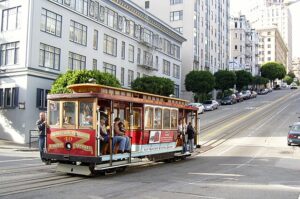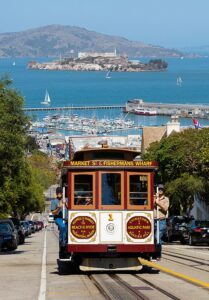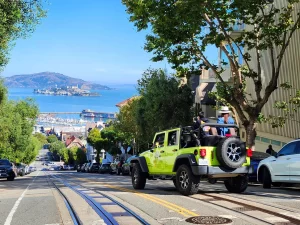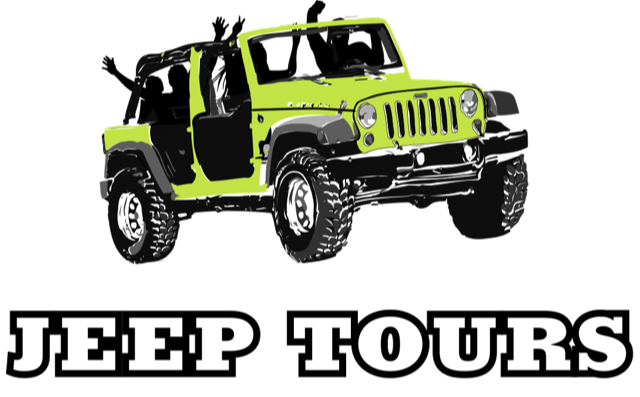CALL US! 1-415-766-2722
Fun@SanFranciscoJeepTours.com
San Francisco’s cable cars aren’t just iconic—they’re a living, clanging, hill-climbing piece of engineering history. These “moving landmarks” have survived earthquakes, political battles, social protests, and generations of curious riders. And somehow, they’re still rolling along exactly as intended more than a century later.
If you’ve ever wondered how San Francisco cable cars work, why they’re still manually operated, or what strange and wonderful stories are hiding behind those wooden benches—grab the handrail, watch your step, and let’s roll.
Cable cars are unforgettable—but the lines can be a commitment. If you’d rather spend your time sightseeing instead of standing, our private San Francisco Jeep Tours cruise past famous cable car streets, steep hill viewpoints, and classic city scenes without the wait or the uphill climbs.
It’s a relaxed, flexible way to connect neighborhoods like Nob Hill, Russian Hill, and Fisherman’s Wharf while still catching those iconic angles.
Explore our Private City Tour (Golden Gate Bridge included)
Forget walkie-talkies—the cable car crew communicates with bells. One ding means stop. Two dings means go. Four dings? Back it up. There’s even a signal for switching cables. It’s basically Morse code… but louder and way more charming.
The famous story says cable cars were invented after horses slipped on steep hills. Nice tale—totally false. Inventor Andrew Hallidie was a wire-rope expert who saw a smarter way to move people uphill. The horse story? Just excellent PR.
In 1965, 19-year-old Mona Hutchin stood on the outside running board—something women weren’t allowed to do. She refused to move, got arrested, sparked protests, and changed the rules forever.
When Mayor Roger Lapham tried to scrap cable cars in 1947, Friedel Klussmann led a voter revolt that saved them. Her legacy? The Powell Street turnaround that still bears her name.
The “Santacade” featured a cable car turned into Santa’s sleigh, complete with rooftop toys. Macy’s responded by putting mannequins on a cable car roof. Classic San Francisco chaos.
Leland Stanford didn’t want to walk three blocks—so he built a private line to his mansion. He later lost a patent lawsuit and paid $30,000. Still probably felt worth it.

Once cable cars made steep hills accessible, wealthy residents flocked uphill. Nob Hill boomed, while Rincon Hill faded fast.
San Francisco’s annual Cable Car Bell Ringing Contest dates back to 1949. Six-time champion Byron Cobb turned safety signals into pure rhythm.
Cable cars burn through wooden brakes fast. Made from knot-free Douglas fir, the old pine brakes even made the streets smell like Christmas.
Most cable car tracks were removed decades ago—but traces and markings remain. Ride at night and the city feels extra cinematic.
Twenty-nine U.S. cities once had cable cars. Today, only San Francisco still operates them.
“Little cable cars climb halfway to the stars.” Tony Bennett debuted the song near the Fairmont Hotel—steps from the Powell Line.
In 1949, Macy’s topped the Santacade with mannequins riding on a cable car roof. No notes.

Before 1906, San Francisco had 600 cable cars. Earthquakes and electric streetcars cut that down to today’s tight-knit fleet.
In 1998, Fannie Mae Barnes became the first female grip operator—then carried the Olympic torch up Hyde Street in 2002.
That “San Francisco treat” advertised directly on cable cars. The box still features one today.
Designated in 1964, cable cars were the only moving landmark in the U.S. for decades—and still steal the show.
Early designs had a separate “dummy” grip car. Riders kept sneaking aboard—so seats were added and history was made.
Look down and you’ll see “LET GO” or “XX” painted on the pavement—real operational signals, not street art.
Oak, steel, brass, and spruce make these beasts heavy—but incredibly graceful.
Four motors pull a constantly moving cable under the streets. Grip operators literally clamp onto it to move.
During anniversaries and celebrations, historic cars sometimes return to service. Spot one? That’s a rare ride.
Yes—especially if it’s your first visit. Riding a cable car is one of those classic “only in San Francisco” experiences. It’s part transportation, part history lesson, and part street theater, all rolled into one clangy, hill-climbing ride.
The Powell–Hyde line is the clear favorite for views. It delivers dramatic hills, Lombard Street scenery, and sweeping looks at the Bay and Alcatraz. The California Street line is also beautiful—and often less crowded.
Cable cars don’t have engines. Instead, a constantly moving steel cable runs beneath the street. Grip operators use a mechanical “grip” to clamp onto the cable to move and release it to stop. The system is powered by motors at a central powerhouse.
Skip boarding at the turnarounds if lines are long. Walk a few stops uphill and hop on mid-line instead. You’ll get the same ride with far less waiting—something locals and savvy visitors swear by.
Locals don’t use them daily, but they absolutely ride them—especially the California Street line or for special occasions. Cable cars are as much a point of pride as they are a tourist attraction.
Early mornings and late afternoons are usually the sweet spot. You’ll avoid peak crowds, enjoy cooler temperatures, and get better lighting for photos—especially on the steep downhill stretches.
Whether you ride, watch, or just photograph them from the hills, San Francisco’s cable cars are more than transit—they’re rolling history.

Cable cars are magical—but they only show you a slice of San Francisco. The steep hills, tight streets, and postcard views that make cable car rides so memorable are also some of the city’s hardest places to navigate on your own.
That’s where a private San Francisco Jeep Tour really shines. You’ll cruise through classic cable car neighborhoods like Nob Hill, Russian Hill, and Fisherman’s Wharf, with the freedom to stop for photos, stories, and views—without waiting in line or clinging to a pole.
It’s a relaxed, local-guided way to connect the dots between cable car history, iconic viewpoints, and neighborhoods that define San Francisco.
